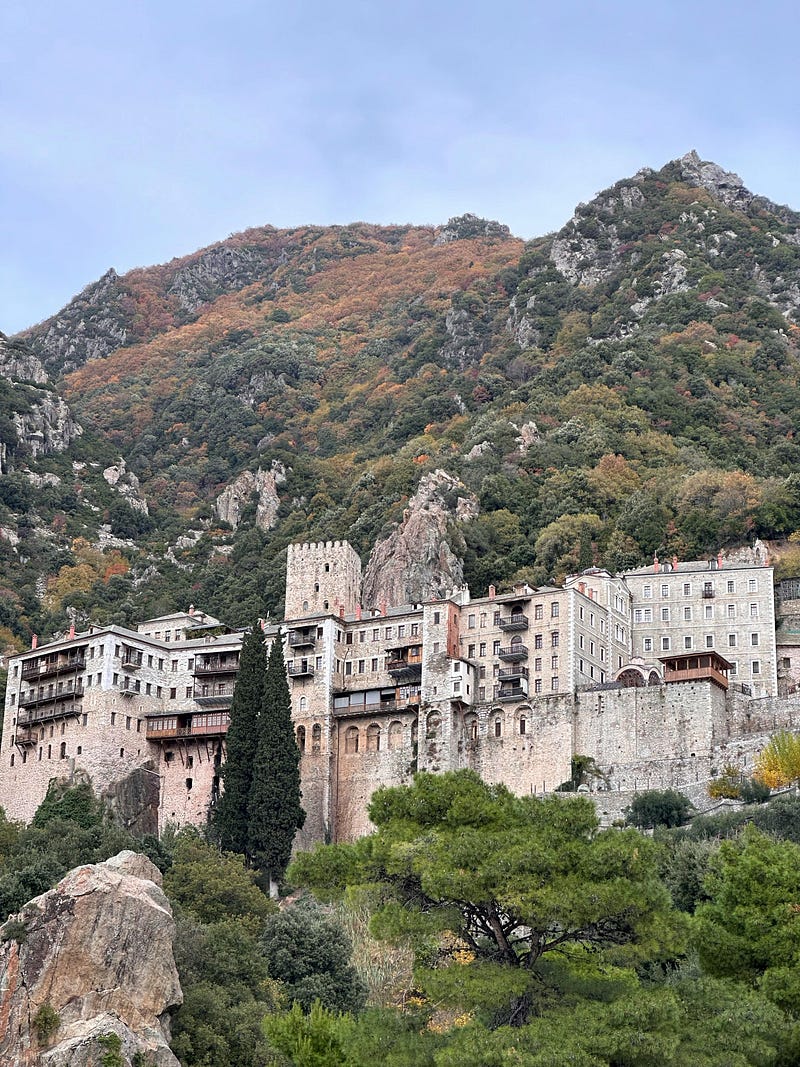Embracing Life: The Journey to Understanding Mortality
Written on
Chapter 1: The Essence of Acceptance
At St. Paul’s Monastery on Mount Athos, a Greek inscription states: “If you die before you die, you won’t die when you die.” This profound saying invites contemplation on mortality.

Deep within each of us lies an often isolated self that harbors a fear of nonexistence. While our spiritual beliefs—whether they stem from Christianity, Judaism, Islam, Buddhism, or even atheism—can provide solace, the journey toward acceptance of death is ultimately one we must navigate alone.
For those grappling with terminal illness, the road to acceptance may feel particularly daunting. How can one embrace the reality of mortality with dignity and grace?
The phrase “die before you die” is commonly attributed to the Sufi poet Rumi, yet it echoes through the teachings of various mystics. This concept invites a pragmatic exploration into how one can metaphorically “die” to their self.
There are moments when individuals—especially the elderly or gravely ill—may feel prepared for their end. My grandmother, who lived to 104, is a prime example. Despite her decline in vision and hearing, she retained a mischievous spirit, often attributing her longevity to simple truths: “I don’t smoke, drink, or cuss.”
A woman of resilience, she faced the harsh realities of the Great Depression and cared for her children with unwavering strength. Yet, in her final years, she struggled with the loss of independence, often questioning her purpose.
In time, she discovered a new meaning: to pray with her caretakers and bring them joy.
Section 1.1: The Search for Purpose
I, too, faced a personal crisis when I felt devoid of purpose. Though I never contemplated suicide, I found myself in a state of despair. The catalyst was a challenging late-life marriage and a move from an urban retirement community, where I had established connections, to a small, unfamiliar town in Colorado.
While my husband adjusted seamlessly, I felt increasingly isolated and disconnected. This abrupt change plunged me into anxiety and depression, leaving me a mere shadow of my former self. I lost interest in food, shedding over 30 pounds, and my zest for life waned. I no longer feared death; instead, I welcomed it.
Subsection 1.1.1: The Transformation
In this tumultuous period, I experienced what is often referred to in Zen Buddhism and Sufism as the “die before you die” process. You may wonder how one accomplishes this and what benefits it may bring.
The truth is, when the burden of your identity becomes too heavy to bear, the pathway to liberation is to let go of that self. It’s important to clarify: this doesn’t refer to physical death.
The “self” is a construct of the mind.
Eckhart Tolle, a spiritual teacher, recounted a similar experience at 29 years old when he realized he could no longer coexist with himself. Upon reflection, he discovered the absurdity of this thought—how could there be both an “I” and a “myself” that he found intolerable? This realization triggered a profound shift, allowing him to detach from the “unhappy and fearful self,” which he deemed a fabrication.
Reading Tolle’s work helped me focus on the present. Gradually, my fixation on past grievances and future anxieties faded. My personal narrative lost its significance, revealing a deeper truth about my existence.
Section 1.2: The Illusion of Self
The essence of my being became clear when I attempted to articulate my identity through writing. The words seemed inadequate, failing to capture the magnificence of my simple awareness.
In moments of stillness, I recognized the inherent goodness within myself, liberated from the fear of external judgment. I understood that I had the right to simply be who I was.
Chapter 2: The Power of Creation
The act of writing itself served as a release from my mental turmoil. Artists often describe feeling like conduits for a greater force during the creative process. Understanding this power isn’t necessary; the act of creation is enough.
I often pondered: “Do you need to grasp how oxygen revitalizes your body to breathe?” The answer is no. Similarly, “Do you need to comprehend how digestion works to eat?” Again, the answer is no.
So, I reminded myself to write, even when life felt incomprehensible.
What I learned is that when writing about yourself, it’s crucial to be skeptical of your internal dialogue. Our thoughts are shaped by a multitude of factors—age, race, gender, culture, religion, and education. Just because we hold beliefs doesn’t make them true; they evolve over time.
Sometimes, the inner voice lacks insight.
Renowned mystics have articulated the importance of self-observation. As Vernon Howard noted, the key technique on the Mystic Path is honest self-reflection.
By documenting your thoughts, you create distance from them, realizing you are not defined by your thoughts or the identity you’ve crafted through language. The exhilaration of this freedom can be profound.
Allow time to pass before revisiting your writings with a calm perspective. You’ll find peace in knowing that the self-image captured on paper is not your true essence.
The authentic you—an awe-inspiring, conscious presence—remains beyond the grasp of words and memory. You are not merely a compilation of experiences; you are, in fact, a hero in your own narrative, which is a delightful revelation.
P.S. If you appreciate visual content, the following video encapsulates some of the concepts discussed in this article.
The first video, "Die While You're Alive — The Way to Lasting Inner Peace," delves into the journey of finding inner tranquility and the importance of letting go of self-identity for true peace.
The second video, "Do You 'Die Before You Die' Only Once?" explores the recurring theme of self-transcendence and the ongoing journey of dying to the self as a path to enlightenment.